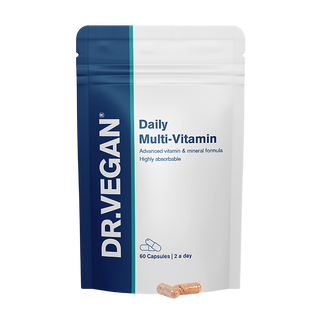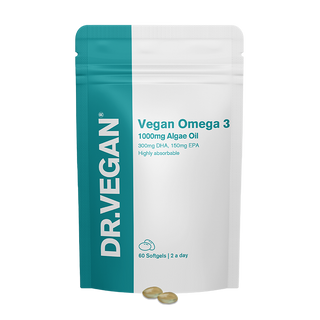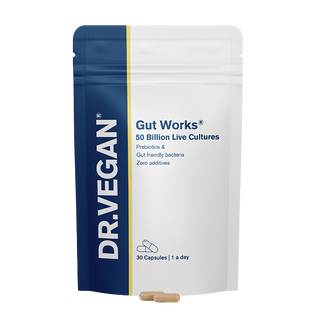This year's most Googled nutrition questions answered

Have you ever wondered what kind of nutrition questions people ask Google or our nutritionists? Well, look no further! Here are 6 of the most common nutrition questions asked on Google and of our nutritionists last year, which our expert nutritionists answer below. As always, DR.VEGAN is here to bring clarity to your diet, nutrition and supplements.
6 of the most Googled nutrition questions
1. "How do I boost my immune system?"
The immune system protects the body against infection and disease, so it’s no wonder this question is in the top 6. Your immune system can't function at its best without the essential nutrients you need every day through your diet or supplements. Not sure if your diet provides them? Create your free online Diet Profile and find out in 3 minutes.

A diet rich in fruits, vegetables and whole grains provides your body with the powerful antioxidants that are needed for healthy immunity. They provide your body with Vitamin C, Vitamin E, and beta-carotene which is converted into Vitamin A. These are all shown in clinical studies to provide a range of health-promoting and disease fighting activities, and they're all in our top 6 plant-based foods to support your immune system. Here are some great foods for each nutrient:
- Vitamin A-rich foods: sweet potatoes, carrots, spinach and other dark leafy greens.
- Vitamin C-rich foods: citrus fruits, peppers, tomatoes, broccoli and strawberries.
- Vitamin E-rich foods: whole grains, sweet potatoes, almonds and vegetable oils.
Other important immunity protecting nutrients include Selenium, Zinc, Folate and Vitamin D3. Learn more in '8 immunity boosting foods'.
Daily Multi-Vitamin

2. What are probiotics and prebiotics?
Probiotics are healthy bacteria found in their trillions in our gut and nearly every part of our body. Our bodies are full of bacteria, parasites, fungi and organisms from food, transmissions from other people and the environment around us, and they can cause fatigue, weak immunity, illnesses and disease if they're not kept under control by probiotics. You can learn more in 'What are probiotics'. Prebiotics are essential fibres that feed probiotics to keep them healthy, so taking a supplement that is a prebiotic and probiotic is very important.
Discover Gut Works | Pre & Probiotic, 50bn CFU
Research into gut health is a relatively new area of nutrition and science in the last 20 years, which isn't a long time compared to say research into cancer, for example. What is clear from all worldwide clinical studies into gut health in the last 20 years is the importance of our gut microbiome, that our gut is connected to our brain via the gut-brain axis and is essentially our second brain, and approximately 70% of our immune system is controlled by our gut.
Our gut health and probiotics, such as Gut Works, the acclaimed pre & probiotic with 50bn CFU, can be vital to our brain health, focus, concentration and mental performance, our energy and our ability to fight fatigue, our immunity, skin health and much more.
You may also enjoy 'Why your gut is your second brain'.
3. "What does calorie deficit mean?"
When you’re in a state of calorie deficit, your body is burning more calories than is being consumed by eating or drinking. A calorie deficit occurs when you eat fewer calories in the day and/or you burn more calories in the day through exercise than you consume.
If you are trying to lose weight, you can calculate the number of calories you need to consume or burn in order to reach your weight loss goal. Plug your stats into an online Basal Metabolic Rate (BMR) calculator which will tell you the amount of energy (calories) you need when you’re at rest with no form of activity.
Once you know how many calories your body needs to maintain your current weight, you can reduce the number of calories eaten per day by 250-500 calories to help you achieve weight loss. Alternatively, you can increase the amount you exercise to burn extra calories, thereby leading to weight loss. Learn more in 'How to lose weight healthily'.
4. "How much fat should I eat?"
Healthy fats are an important part of your diet as they provide you with energy and help carry fat-soluble vitamins around your body, including Vitamin A, Vitamin D, Vitamin E and Vitamin K and many others!
However it's important you don't eat too much fat or even the wrong balance of fats as this can contribute to a range of health issues. Omega 3 fatty acids are an essential fat for all diets - they can't be produced or stored by the body, so should be gained via your diet or an Omega 3 supplement with 1000mg of Omega oil and, most importantly, has 300mg of DHA and 150mg of EPA per serving. Our nutritionists discuss the importance of Omega 3 in 'What is Omega good for'.
Vegan Omega 3

Ensure you get around 20-25% of your energy intake from poly-unsaturated fats which are found in soya, sunflower and sesame oils, or mono-unsaturated fats which can be found in olive oil (the healthy kind of fats). You may also enjoy 'The proven health benefits of soya'.
Make sure you get less than 10% from saturated fats which are found typically in meat, dairy products, processed foods like cakes and biscuits, bacon, sausages and cured meats.
5. "How much Vitamin D do I need?"
Vitamin D can be obtained from food sources but it isn't widely present in food. The major natural food sources are oily fish, milk, eggs and meat. When following a plant-based diet you can still find some Vitamin D in fortified plant milk alternatives, mushrooms and fortified cereals.
Children from the age of 1 year and adults need at least 10 micrograms of Vitamin D per day. It can be difficult for anyone to reach this amount during the dark winter months which is why Public Health England recommend everyone supplements with Vitamin D3.
Remember, NRVs are not a target to reach, they're the minimum you need of a nutrient to avoid a health condition caused by a deficiency in that nutrient. That's why you should be wary of supplements which contain only 100% of an NRV. Learn more in what are NRVs and are they important and seven ingredients in supplements to avoid.
During the summer months when the sun is out, you can boost your Vitamin D by spending short periods outside, exposing your skin to natural sunlight daily. Do remember that if you wear suncream or sunblock on your face, this inhibits your body's ability to make Vitamin D.
Discover Hair Saviour | Strong and lustrous hair from within
Learn more in 'How do I know if I'm deficient in Vitamin D?' and 'Why is Vitamin D so important'. Good tip - if you're unsure when Vitamin D absorption is at its highest, take a look at your shadow to help. If your shadow is shorter than you, your skin will be producing Vitamin D.
6. "What are BCAAs?"
This is a surprisingly popular question on Google. 'BCAA' is short for 'branched-chain amino acids'. They're a group of 3 amino acids ('leucine', 'isoleucine' and 'valine') that are essential for building and repairing muscles.
These amino acids are especially helpful after exercise as they help to preserve and support muscle tissue after a workout. Since BCAAs are regarded as essential amino acids, meaning they can’t be made by the body, it's really important to obtain them from the foods in your diet.
Although BCAAs are typically found in animal products, it’s easy to get them on a plant-based diet by eating soy foods such as tofu and tempeh, quinoa, brown rice, beans, lentils, nuts or seitan. Learn more in 'The proven health benefits of soya'.
As long as you’re getting enough of these protein powered plant-foods in your diet, BCAA supplementation shouldn't be necessary.
You might also enjoy The 5 benefits of Turmeric and our brilliant and delicious plant-based recipes.
Discover our range of award-winning plant-based vitamins and supplements.
Want to hear more from our nutritionists? Sign up to our email newsletter for free tips and advice:
By nutritionist Riya Lakhani, ANutr




















